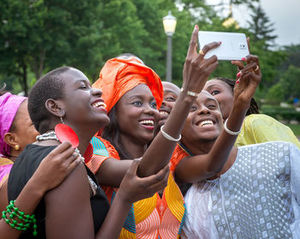Young African leaders come to the U.S. for intense six-week program
Published: July 29, 2015 / Author: Tom Gallagher

Summertime at the University of Notre Dame in South Bend, Ind., is perhaps the most idyllic time of the year. The busyness of the school year and nationally-competitive athletics give way to a quieter time and a slower pace. But not for 25 men and women from 19 Africa countries, who descended upon campus in June for an intense and demanding six-week learning experience. For the second consecutive year, Notre Dame is hosting a group participating in the Mandela Washington Fellowship for Young African Leaders Initiative (YALI).
YALI is a long-term effort of President Barack Obama to invest in the next generation of African leaders. It is administered through the U.S. State Department in partnership with the U.S. Agency for International Development and the Peace Corps. Each year, for five years, 500 YALI fellows will come to the U.S. for the summer program in public management, civic affairs or business and social entrepreneurship. Notre Dame is one of 20 U.S. universities hosting a group of fellows. But it is not easy to be accepted. In the first year, some 50,000 applications were received for the 500 spots. This year, almost 30,000 applications were received.
The Notre Dame Initiative for Global Development received a $150,000 grant this year from the U.S. State Department to train young African leaders in entrepreneurship. However, Notre Dame’s program cost approximately $450,000, and underwriters include Coca-Cola, IBM, Capsim, and Bisk Education.
On campus, the Mendoza College of Business Nonprofit Executive Program, the Kellogg Institute for International Studies’ Ford Family Program in Human Development Studies and Solidarity and the University’s Engineering, Science, Technology and Entrepreneurship Excellence Masters program are collaborating to implement the YALI program.
“The fellows come to campus not as ‘students,’ but as our peers,” said Dr. Marc Hardy, director of YALI and director of the university’s Nonprofit Executive Education Department in the Mendoza College of Business. Each of the attendees is an accomplished professional. “We encourage the fellows to question the instructors, share their own expertise,” said Hardy.
Read the entire story on the National Catholic Reporter website.




